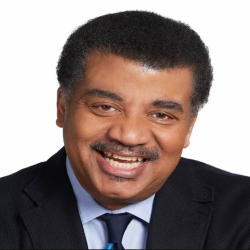
Neil deGrasse Tyson
American Astrophysicist and Writer
| Date of Birth | : | 05 Oct, 1958 |
| Place of Birth | : | Manhattan, New York, United States |
| Profession | : | Astrophysicist, Writer |
| Nationality | : | American |
| Social Profiles | : |
Facebook
Twitter
Instagram
|
Neil deGrasse Tyson is an American astrophysicist, author, and science communicator. Tyson studied at Harvard University, the University of Texas at Austin, and Columbia University. From 1991 to 1994, he was a postdoctoral research associate at Princeton University.
Biography
When Tyson was nine years old, his interest in astronomy was sparked by a trip to the Hayden Planetarium at the American Museum of Natural History in New York City. Tyson received a bachelor’s degree in physics from Harvard University in Cambridge, Massachusetts, in 1980 and a master’s degree in astronomy from the University of Texas at Austin in 1983. He began writing a question-and-answer column for the University of Texas’s popular astronomy magazine StarDate, and material from that column later appeared in his books Merlin’s Tour of the Universe (1989) and Just Visiting This Planet (1998).
Tyson then earned a master’s (1989) and a doctorate in astrophysics (1991) from Columbia University, New York City. He was a postdoctoral research associate at Princeton University from 1991 to 1994, when he joined the Hayden Planetarium as a staff scientist. His research dealt with problems relating to galactic structure and evolution. He became acting director of the Hayden Planetarium in 1995 and director in 1996. From 1995 to 2005 he wrote monthly essays for Natural History magazine, some of which were collected in Death by Black Hole: And Other Cosmic Quandaries (2007), and in 2000 he wrote an autobiography, The Sky Is Not the Limit: Adventures of an Urban Astrophysicist. His later books included Astrophysics for People in a Hurry (2017) and Letters from an Astrophysicist (2019).
As director of the Hayden Planetarium, Tyson oversaw a complete replacement of the facility, which opened in 2000. The new planetarium’s exhibit categorized the solar system’s bodies into groups. Pluto was not classified with either the terrestrial or Jovian planets but was grouped with the Kuiper belt objects. That decision (made six years before the International Astronomical Union designated Pluto as a dwarf planet) proved quite controversial, and Tyson was deluged with angry letters. He wrote about that experience in The Pluto Files: The Rise and Fall of America’s Favorite Planet (2009), in which he attributed some of the sentimental attachment to Pluto’s planethood to cultural factors such as Pluto being the only planet discovered by an American (astronomer Clyde Tombaugh) and having the popular cartoon character of Mickey Mouse’s dog named after it.
Aside from his many books, Tyson was a well-known popularizer of science on television and radio. He appeared frequently on such talk shows as The Daily Show with Jon Stewart and The Colbert Report. In 2004 he was host of the four-episode television series Origins, which examined the origins of the universe, stars, planets, and life. From 2006 to 2011 he was the host of the television series NOVA scienceNOW, and, beginning in 2009, he was also host of the weekly radio show StarTalk. From 2015 Tyson presided over a television talk show based on his radio program, and he also wrote several companion books, including Cosmic Queries: StarTalk’s Guide to Who We Are, How We Got Here, and Where We’re Going (2021). In 2014 he hosted the television series Cosmos: A Spacetime Odyssey, a “continuation” (as he termed it) of astronomer Carl Sagan’s popular series Cosmos (1980). He also made occasional appearances as himself in films and on television. He voiced an imaginary weasel in the children’s animated movie Ice Age: Collision Course (2016).
In 2018 several women accused Tyson of sexual misconduct. The broadcasters he worked with—National Geographic and Fox—suspended his projects while they investigated the allegations. In 2019 the inquiries were completed, and work resumed on his various shows. Later that year the American Museum of Natural History announced that it had finished its investigation into the claims and that Tyson would continue to serve as director of the Hayden Planetarium.
Quotes
Total 35 Quotes
In the end, it's the people who are curious who change the world.
Knowing how to think empowers you far beyond those who know only what to think.
The good thing about science is that it's true whether or not you believe in it.
I love being wrong because that means in that instant, I learned something new that day.
The Universe is under no obligation to make sense to you.
Need a distraction today? Not only does 12 + 1 = 11 + 2, but the letters "twelve plus one" rearrange to give you "eleven plus two."
One of the biggest problems with the world today is that we have large groups of people who will accept whatever they hear on the grapevine, just because it suits their worldview—not because it is actually true or because they have evidence to support it. The really striking thing is that it would not take much effort to establish validity in most of these cases… but people prefer reassurance to research.
The worst thing that ever happened to America was the 19th Amendment.
We are part of this universe; we are in this universe, but perhaps more important than both of those facts, is that the universe is in us.
Claiming there is no other life in the universe is like scooping up some water, looking at the cup and claiming there are no whales in the ocean.
